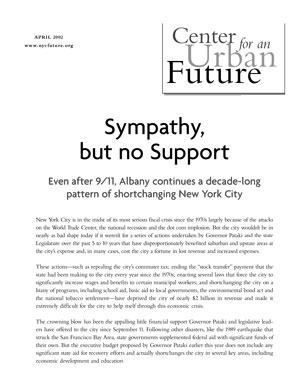Like most other years, the budget approved May 16 in Albany throws a few bones to New York City. It modestly increases general education support, finally repays $400 million in school aid owed for years and allows hikes in cigarette taxes, parking fines and cell phone surcharges. Yet, the budget is shocking for its failure to provide more meaningful financial help as the city struggles to regain its footing.
Remarkably, it looks like any other election-year budget, not an attempt to reckon with post-9/11 needs.
The Bush administration and Congress — not always friends of the city — have admirably promised more than $21 billion in aid. That's a responsibility the federal government needed to assume. But the state also has a duty.
Federal funds will help rebuild lower Manhattan's infrastructure, but won't be used to deal with 130,000 job losses or close a $5 billion budget gap. Sadly, this year's state budget won't provide enough help either.
The budget does include tax breaks to families of those who died on Sept. 11 and sets forth three sales-tax-free days in lower Manhattan, yet it spells out no other significant economic development aid for the city. In fact, it appears that upstate and suburban areas will receive the lion's share of the new economic development funds, as they have for the past several years.
Upstate certainly continues to need attention, but the five boroughs have accounted for nearly 97% of the jobs lost in the state in the past year. Meanwhile, the Bronx (9.1%) and Brooklyn (8.4%) now have among the highest unemployment rates in the state.
Even more disappointing, the state failed to help the city avoid some of the desperate measures it will have to implement. It has been clear that without help, the city would have to borrow $1.5 billion, cut police and school budgets and possibly raise taxes. Yet, the best Gov. Pataki and the Legislature could do was to let the city impose a handful of new taxes and fees.
State lawmakers should have at least attempted to undo some measures they enacted when the city was flush — such as repealing the city's $400 million-a-year commuter tax, ending the $114 million-a-year stock transfer payment and excluding the city from increases in general municipal aid that went to every other city in the state.
Pataki and legislative leaders have provided emergency aid packages to several distressed cities, counties and school districts, including some whose problems resulted from financial mismanagement. Shouldn't the city, whose fiscal woes largely stem from 9/11, qualify for similar support?
Given its own fiscal problems, there's clearly a limit to what the state could have done. But it's not like Albany passed an austere budget. It increases spending 6%, adds $700 million in tax cuts and sprinkles goodies around the state.
Mayor Bloomberg should have been more aggressive in pressing for help. But wasn't it obvious? State leaders shouldn't have to be reminded that a healthy New York City usually means good things for the rest of the state.



